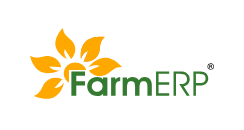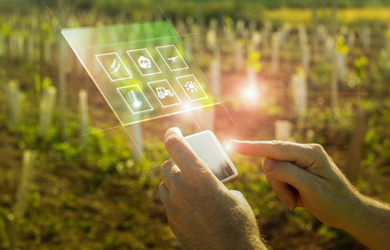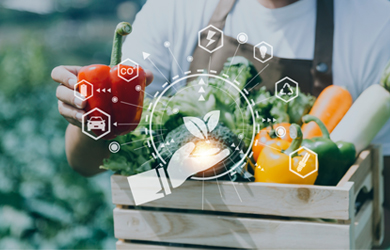Farm Sustainability: Is Sustainable Agriculture a Path to a Better Food Future?
Today, in intellectual discussions around sustainable agriculture, there is a strong plea for attention to ‘do more with less’. This approach comes to light with a significant decline in arable land and major resources like water but an unprecedented rise in the world’s population. The role of technological innovations such as smarter farm equipment, precision agricultural tools, and farm management software is also becoming more visible in such approaches.
Technology implementation is becoming a significant trend in sustainable farming as it helps farmers care for their crops efficiently while using less water, fertilizers, and pesticides. Moreover, with climate-smart farming practices, agriculture is likely to play a role in offsetting greenhouse gas emissions beyond the farm gate.
But, how? Let’s find out.
What is Sustainability on a Farm?
When it comes to environmental benefits, sustainable agriculture refers to the efficient management of natural systems and resources that farms depend on. It involves building healthy soil, managing water wisely, preventing erosion, and promoting biodiversity while reducing air and water pollution.
Economically sustainable agriculture, on the other hand, allows farmers to be profitable and contribute to local economies. They give access to healthy food for all and prioritize people and communities over mass chemical food production.
One of the primary goals of sustainability is to avoid damaging environmental impacts without compromising the productivity and profitability of the farms.
The Importance of Sustainable Agriculture
Ever wondered what will agriculture be like in 2050? Over the years, industrialized agriculture has prioritized large-scale factories and employed farming practices that degrade soil, air, water, and the environment as a whole. In addition, expanding urban areas are taking over the agricultural land and the impact of climate change is becoming more prominent in food production. This is where the importance of sustainability comes in.
Toxic chemicals used on farms are major pollutants and synthetic fertilizers and pesticides can poison the surrounding air, soil, and water, as well as leave residue on land and food. In addition, gasoline has long been heavily used in farm machinery and equipment which contribute to greenhouse gas emissions. This is further worsened by the burning of fields to prepare them for planting a new crop.
Water sources are also being used faster than they can be replenished. For instance, studies have reported that it takes approximately 15 gallons of water to produce 16 almonds. Therefore, traditional farming approaches along with the livestock sector contribute significantly to degrading freshwater systems across the globe.
According to United Nations Environment Programme (UNEP), sustainable agriculture supports a greater level of biodiversity than conventional farming while using about 56% less energy per unit of crops produced and creating 64% less GHG emissions per hectare.
Current Challenges of Sustainable Food Production
Sustainable farming is labor-intensive and may require 2.5 times more labor than conventional farming. Therefore, the price of sustainably produced food products is comparatively high that their conventional variants, leading to affordability issues, especially in low- and middle-income countries.
The lack of understanding and policy to prevent agricultural pollution and other kinds of environmental degradation has also been limiting the adoption of sustainable farming as a global standard. Low awareness of using technologies in sustainable farming practices to improve profitability and productivity is further considered a major constraint.
Technologies Shaping Sustainable Farming Practices
Unlike other industries, agriculture has not been the early adopter of technologies, but farmers have been consistent in bringing tech to the field. Today, fields across the world are plowed with the aid of satellites, GPS, and sophisticated sensors. Farmers are also replacing gasoline-driven farm machinery with autonomous farm machinery and agriculture robots. These technologies are making a huge contribution to sustainability.
IoT Sensors and AI Fill Finance Gaps in Sustainability
Disruptive technologies like AI, ML, and IoT are key components of precision agriculture. These technologies help farmers get precise information from the field in real-time, access weather conditions and rainfall patterns, and insights into the condition of each crop to make informed decisions.
IoT sensors are widely installed in agricultural machinery and equipment, fields, and even crops to collect all possible data available. Subsequently, AI and ML algorithms are used to draw an analysis of these data and take action immediately. These approaches reduce the excessive use of resources while targeting natural fertilizers and pesticides only where they are needed.
Moreover, the more farmers know about their crops and farms, the better they can allocate resources, including labor, and ultimately reduce operational costs. This will further help bring down the price of sustainably produced food products.
Drones and Autonomous Machinery Reduce GHG Emissions
Industrial farming is one of the main contributors to greenhouse gas emissions. In sustainable farming, autonomous machinery not only eliminates the use of gasoline but also operates without an operator. For example, a fully autonomous tractor can till and plant seeds with high accuracy, resulting in better farming precision and greater yields. In addition, reduced use of labor leads to greater financial returns, thus bringing down the price of sustainably produced food.
Drones are also increasingly used in sustainable farming to capture aerial imagery ranging from simple visible-light photographs to multi-spectral imagery based on the camera mounted. The images can then be used to analyze different aspects of plant health and other assets.
Farm Management Software at the Heart of Sustainability
From crop management to inventory checks and supply chain efficiency, farm management software has been playing an important in agricultural practices, and sustainability is not an exception.
Agriculture management systems ensure transparency and traceability in the journey from farm to table, reducing food loss in the supply chain. It aids in detecting any condition that may affect food transportation and eliminating the ecological and social price of industrialized farms.
Farm management software makes it possible to achieve maximum sustainability during farm operations with less waste and higher yields. It allows the calculation of resources to be provided to a specific crop against water wastage. The ability to forecast risks helps in protecting crops from diseases and moderates the use of pesticides.
Sustainably produced food is certified in a way that requires it to be separated from conventional foods during processing and transportation. Sometimes, the supply of certain food produced through sustainable farming is limited. Farm management software enables the traceability of the supply chain to monitor each step of sustainable food production and processing and ensure product quality.





